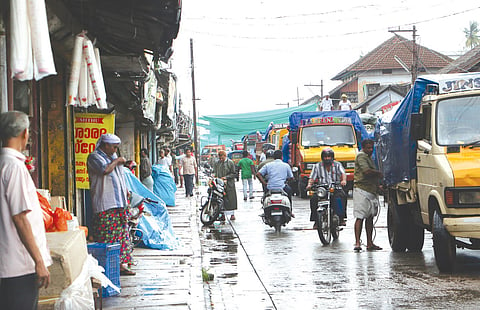Keeping Alive Memories of Thriving Trade
KOZHIKODE: Valiyangadi, the grand old bazaar of Malabar which has a history of centuries-old maritime trade, continues to be abuzz with hectic commerce, yet with the changing times, the trade hub seems to be losing its erstwhile sheen.
With the growth of various towns and swanky supermarkets across Malabar, the pattern of business at Valiyangadi has also undergone rapid changes of late, say many who have been part of the bazaar for several decades.
Valiyangadi, located a few metres off the beach with its traditional shops and warehouses having wooden doors and tiled roofs has not undergone any facelift, except that the old concrete road through the bazaar was renovated a few years ago. “Valiyangadi can ideally be maintained as a heritage site. Reconstructing the old buildings here would not be viable as many buildings share their walls. The bazaar, which employs over 2,000 workers, is in dire need of a comfort station with hygienic toilets,” said A Shyam Sunder, president of Valiyangadi Food Grains and Provisions Merchants’ Association, which has around 300 members.
Valiyangadi enjoyed a thriving business even during the late 20th century which is still alive in the memory of veteran traders. Those were the days when thousands from across Malabar, and even from other parts of the state, used to throng the bazaar from early morning till midnight purchasing food grains, pulses and other articles, remembers 76-year-old O S Chandran, owner of the shop M/S P K Nair and O S Chandran, which sells guns.
“Goods used to arrive in the bazaar in ‘uru’ from Mumbai and merchants from Wayanad, Kannur and Malappuram and distant areas used to transport goods in bullock carts,” remembers Chandran, who joined the business here at the tender age of 19. Rickshaws pulled by men and horse carts thronged streets as cars were few.
“During those days, after the hectic business, I used to return to my house at Bilathikulam late in the night in a hand-pulled rickshaw for which 12 ‘anas’ was charged,” he adds.
The bazaar was populated with hand-pulled trolleys which have now been replaced by goods autorickshaws. “The hard labour of the workers of that era is beyond the imagination of the new generation,” says Mohammed, an aged headload worker.
The presence of hundreds of trucks at the bazaar nowadays is the noticeable change that easily comes to the notice of many old traders. As there were no lorries in those olden days, rice and grains used to arrive in rail wagons from Andhra, they say.
“These days, a few truckloads of rice are brought to Valiyangadi as the demand has fallen with new markets developing across small towns and middlemen also arriving on the scene to whom interstate mill owners directly sell rice and food grains. The system of commission agents has been largely replaced by that of canvassing agents. Earlier, commission agents used to stock rice in bulk quantities sourced directly from mill owners and sold it when prices went up. The amount was returned to mill owners after the sale. Nowadays, canvassing agents at local markets in small towns place orders for less number of sacks of rice or pulses which are provided to them directly by inter-state mills at their godowns and the payment is received in advance,” says Praveenkumar, a staff at one of the rice shops at the bazaar.
Many warehouses which used to sell nearly 2,000 sacks of rice a day till 1990s now witness sales of less than 200 sacks of rice. Instead of the 32,000 sacks which used to arrive in wagons then, now rice is brought in trucks having a capacity of 17 tonnes. In place of the 2 lakh sacks stored in a warehouse, now only around 2,000 sacks are stored, says a rice merchant.
“As huge quantities of rice used to be stocked in the godowns of Valiyangadi for several months, there were flour mills which polished rice to remove fungus. Thousands of sacks of rice were polished at my flour mill earlier with water or oil; but, nowadays, the need for polishing rarely arises as lesser quantities are stocked in shops,” says 60-year-old Ummer, who has been part of Valiyangadi since the age of 14.
However, the traders testify that even now merchants from across the state arrive at Valiyangadi to purchase items like dates, as the largest variety of the dry fruit sourced directly from West Asian countries is available at cheaper rates here when compared to other wholesale markets in the state, says Ravidharan, a merchant.

